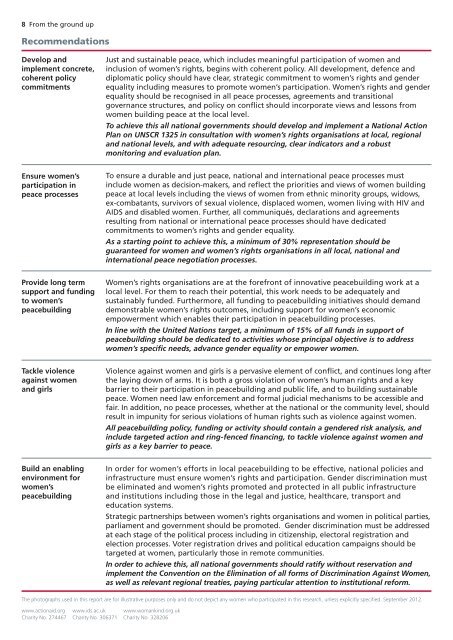From-the-ground-up_Womankind-and-ActionAid_FINAL
From-the-ground-up_Womankind-and-ActionAid_FINAL
From-the-ground-up_Womankind-and-ActionAid_FINAL
You also want an ePaper? Increase the reach of your titles
YUMPU automatically turns print PDFs into web optimized ePapers that Google loves.
8 <strong>From</strong> <strong>the</strong> <strong>ground</strong> <strong>up</strong><br />
Recommendations<br />
Develop <strong>and</strong><br />
implement concrete,<br />
coherent policy<br />
commitments<br />
Ensure women’s<br />
participation in<br />
peace processes<br />
Provide long term<br />
s<strong>up</strong>port <strong>and</strong> funding<br />
to women’s<br />
peacebuilding<br />
Tackle violence<br />
against women<br />
<strong>and</strong> girls<br />
Build an enabling<br />
environment for<br />
women’s<br />
peacebuilding<br />
Just <strong>and</strong> sustainable peace, which includes meaningful participation of women <strong>and</strong><br />
inclusion of women’s rights, begins with coherent policy. All development, defence <strong>and</strong><br />
diplomatic policy should have clear, strategic commitment to women’s rights <strong>and</strong> gender<br />
equality including measures to promote women’s participation. Women’s rights <strong>and</strong> gender<br />
equality should be recognised in all peace processes, agreements <strong>and</strong> transitional<br />
governance structures, <strong>and</strong> policy on conflict should incorporate views <strong>and</strong> lessons from<br />
women building peace at <strong>the</strong> local level.<br />
To achieve this all national governments should develop <strong>and</strong> implement a National Action<br />
Plan on UNSCR 1325 in consultation with women’s rights organisations at local, regional<br />
<strong>and</strong> national levels, <strong>and</strong> with adequate resourcing, clear indicators <strong>and</strong> a robust<br />
monitoring <strong>and</strong> evaluation plan.<br />
To ensure a durable <strong>and</strong> just peace, national <strong>and</strong> international peace processes must<br />
include women as decision-makers, <strong>and</strong> reflect <strong>the</strong> priorities <strong>and</strong> views of women building<br />
peace at local levels including <strong>the</strong> views of women from ethnic minority gro<strong>up</strong>s, widows,<br />
ex-combatants, survivors of sexual violence, displaced women, women living with HIV <strong>and</strong><br />
AIDS <strong>and</strong> disabled women. Fur<strong>the</strong>r, all communiqués, declarations <strong>and</strong> agreements<br />
resulting from national or international peace processes should have dedicated<br />
commitments to women’s rights <strong>and</strong> gender equality.<br />
As a starting point to achieve this, a minimum of 30% representation should be<br />
guaranteed for women <strong>and</strong> women’s rights organisations in all local, national <strong>and</strong><br />
international peace negotiation processes.<br />
Women’s rights organisations are at <strong>the</strong> forefront of innovative peacebuilding work at a<br />
local level. For <strong>the</strong>m to reach <strong>the</strong>ir potential, this work needs to be adequately <strong>and</strong><br />
sustainably funded. Fur<strong>the</strong>rmore, all funding to peacebuilding initiatives should dem<strong>and</strong><br />
demonstrable women’s rights outcomes, including s<strong>up</strong>port for women’s economic<br />
empowerment which enables <strong>the</strong>ir participation in peacebuilding processes.<br />
In line with <strong>the</strong> United Nations target, a minimum of 15% of all funds in s<strong>up</strong>port of<br />
peacebuilding should be dedicated to activities whose principal objective is to address<br />
women’s specific needs, advance gender equality or empower women.<br />
Violence against women <strong>and</strong> girls is a pervasive element of conflict, <strong>and</strong> continues long after<br />
<strong>the</strong> laying down of arms. It is both a gross violation of women’s human rights <strong>and</strong> a key<br />
barrier to <strong>the</strong>ir participation in peacebuilding <strong>and</strong> public life, <strong>and</strong> to building sustainable<br />
peace. Women need law enforcement <strong>and</strong> formal judicial mechanisms to be accessible <strong>and</strong><br />
fair. In addition, no peace processes, whe<strong>the</strong>r at <strong>the</strong> national or <strong>the</strong> community level, should<br />
result in impunity for serious violations of human rights such as violence against women.<br />
All peacebuilding policy, funding or activity should contain a gendered risk analysis, <strong>and</strong><br />
include targeted action <strong>and</strong> ring-fenced financing, to tackle violence against women <strong>and</strong><br />
girls as a key barrier to peace.<br />
In order for women’s efforts in local peacebuilding to be effective, national policies <strong>and</strong><br />
infrastructure must ensure women’s rights <strong>and</strong> participation. Gender discrimination must<br />
be eliminated <strong>and</strong> women’s rights promoted <strong>and</strong> protected in all public infrastructure<br />
<strong>and</strong> institutions including those in <strong>the</strong> legal <strong>and</strong> justice, healthcare, transport <strong>and</strong><br />
education systems.<br />
Strategic partnerships between women’s rights organisations <strong>and</strong> women in political parties,<br />
parliament <strong>and</strong> government should be promoted. Gender discrimination must be addressed<br />
at each stage of <strong>the</strong> political process including in citizenship, electoral registration <strong>and</strong><br />
election processes. Voter registration drives <strong>and</strong> political education campaigns should be<br />
targeted at women, particularly those in remote communities.<br />
In order to achieve this, all national governments should ratify without reservation <strong>and</strong><br />
implement <strong>the</strong> Convention on <strong>the</strong> Elimination of all forms of Discrimination Against Women,<br />
as well as relevant regional treaties, paying particular attention to institutional reform.<br />
The photographs used in this report are for illustrative purposes only <strong>and</strong> do not depict any women who participated in this research, unless explicitly specified. September 2012.<br />
www.actionaid.org www.ids.ac.uk www.womankind.org.uk<br />
Charity No. 274467 Charity No. 306371 Charity No. 328206


